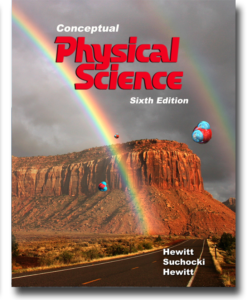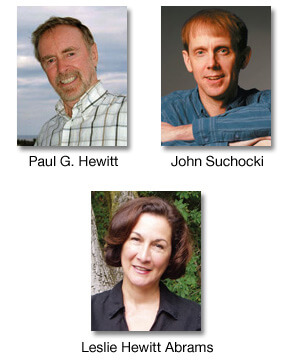
Physical Science
We have two physical science pre-built courses. The first course listed below is the full version of our Conceptual Physical Science textbook covering all chapters. The second course is a bit shorter with a focus on physics, astronomy, and chemistry.
About Our Pre-Built Courses
We offer pre-built courses for all of our titles. A pre-built course works well when using Conceptual Academy much like the video version of a traditional textbook. Your students will have access to all the content listed within this pre-built course (see below). This provides flexibility from one semester to the next. For each semester you might direct students to be responsible for only select lessons or chapter sections.
Once a pre-built course is uploaded to your instructor’s account, you can modify it as you see fit to “make it your own”. This includes updating the FYI pages and setting dates for each lesson so that students know what to study by when. You can also remove select chapter sections you are not wanting students to see.
For a Conceptual Academy course aligned more precisely to a particular class schedule, we recommend you contact us to request a customized course. To learn more about customizing your course, please look to the help documents within your instructor profile page.
1. Physical Science, Full Textbook (video version)

Accompanying Printed Textbook: Conceptual Physical Science, 6e (CPS6e)
Review a .pdf of the front matter of this textbook, including its table of contents. Here is a link to sample pages from a chapter section on Newton’s second law of motion: CPSSample.
About This Course
This comprehensive course collates all 28 chapters of the Conceptual Physical Science textbook into 5 units and a total of 28 lessons (one lesson per chapter). Along with a library of video tutorials and reading assignments, included are worksheets, interactive simulations, study advice from the authors, automated quizzes with grade book, complete labs using household materials, and unit exams.
5 Units; 28 Lessons
Unit A: Physics I
Unit B: Physics II
Unit C: Chemistry
Unit D: Earth Science
Unit E: Astronomy
Download this document to view Chapter Section details: PreBuiltCPSFull
2. Physical Science, Physics, Astronomy, Chemistry

Accompanying Printed Textbook: Conceptual Physical Science, 6e (CPS6e) Sold separately
Review a .pdf of the front matter of this textbook, including its table of contents. Here is a link to sample pages from a chapter section on galaxies: AstronomySample.
About This Course
This is a rich and inspiring introductory physical science pre-built course with a focus on the concepts of physics, astronomy, and chemistry. For physics, this includes Newton’s Laws, momentum, energy, gravity, and the mechanics of orbital motion followed by fluids, heat and electricity. Students explore the nature of sound and light as well as atoms and the source atomic energy. This sets the stage for an exploration of the basic concepts of astronomy, which include a study of our solar system, stars, galaxies, and the universe as a whole. With an understanding of how the elements of the periodic table are synthesized within stars, and with a background in physics, the student is set to explore the basic concepts of chemistry including chemical bonding, mixtures, chemical reactions, and organic chemistry.
6 Units; 26 Lessons
Unit A: Mechanics
Unit B: Fluids and Energy
Unit C: Waves and Atoms
Unit D: Astronomy
Unit E: Elements of Chemistry
Unit F: Chemical Reactions
Download this document to view Chapter Section details: PreBuiltCPSPAC
About Laboratories
For these Conceptual Physical Science courses, ample laboratory activities are included right within the weekly lessons. The materials for these activities, such as white glue, coins, and popsicle sticks, are readily available within your household or a discount store. This is important as it allows you to assign labs for various “homework” assignments. These lab activities are collated from a the following sources:
1) You’ll find the “Think and Do” activities described within the textbook end-of-chapter material. These activities tend to be short and sweet, as well as numerous.
2) We offer “PhET Labs” that make use of computer simulations created through the PhET program sponsored by the University of Colorado. The PhET simulations themselves are embedded within a lesson’s From Your Instructor (FYI) page. For many of these simulations you’ll also find within the Doc Share a write-up worksheet that guides the student through a simulation-based activity.
3) We offer the Conceptual Physics and Conceptual Chemistry Beyond the Laboratory Manuals created by professors Stephanie Blake of Ozarks Technical College, MO, and Brandon Burnett of Weber State University, UT. These creative manuals features many engaging and mind-opening hands-on experiments utilizing only readily available materials. For each activity, after following through a prescribed set of instructions (guided learning), the student is then pushed to create their own experimental procedure on a related subject (inquiry learning). The innovative yet safe activities of these manuals use only materials you’ll find within the home or a local discount store. With these manuals you can implement what we call the “flipped lab” where students conduct labs at home, which allows for critical follow-through to occur within class. You’ll find these manuals as free downloads on our labs page.
4) Our official Conceptual Physical Science Lab Manual contains about 100 activities. In conjunction with the above mentioned activities, we have narrowed this down to 18 labs, which we have cut and pasted into documents made available to students through the FYI pages. You’ll find most of these particular labs within the Earth science and astronomy chapters. Like the other activities, these too require materials that should be readily available. For example, to measure a star’s ascension, you need only a straw, protractor, pencil, and a weighted string.
Sample Chemistry Video: Acids and Bases

“The CONCEPTUAL approach means a focus on the concepts. Although much of physical science is mathematical, a firm grasp of its concepts is crucial to understanding. Hence our motto: concepts first. Enjoy!”
Sample Earth Science Video: Glaciers
